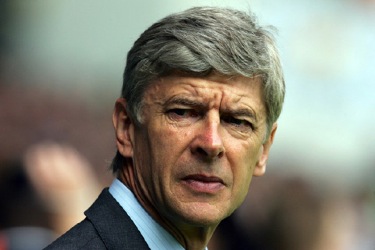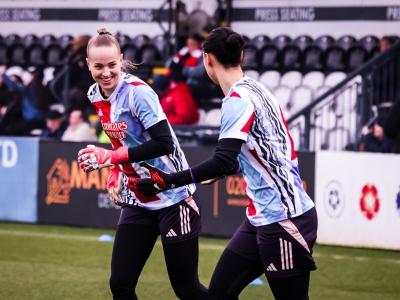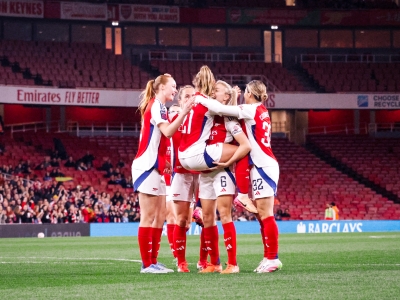If Fabregas leaves Arsenal in the summer then it will be a momentous moment in the reign of Arsene Wenger. It will be the first time a world class player leaves Arsenal under him before reaching his peak. The fact is that the club captain, talisman and fulcrum of the team does not believe in the manager and his youth strategy nor his plans for the future. This is a damning indictment on our manager’s youth strategy and should be a wake up call to all those who still believe Wenger can take the club forward.
This failed policy, while possibly needed at the time of the stadium move when money was tight has not been necessary over the past three seasons. It is only the manager’s continued stubborn belief in an unrealistic and flawed strategy that has prevented proper squad strengthening.
This shows no signs of changing. Even after his charges fluff the opportunity to win the easiest Premiership for over 15 years, winning one and losing five games against the other top four teams, throwing away two goal leads against relegation threatened teams in the last quarter of games, the manager still thinks we only need two or three signings rather than the radical overhaul most fans (and our best player) think we need.
Wenger’s youth policy has always had two major flaws, which the past couple of months have shown up all too glaringly. The first is that however talented the young players are there needs to be a core of experienced players to teach the younger players how to win things (eg Man Utd in the mid-90s) and also offer competition for places so if a young player performs poorly he will be dropped. For example Nani and Valencia at Man Utd can and have been dropped and replaced by Giggs or Park. This if anything has improved both players in the second half of the season.
Secondly, players, especially the most talented and ambitious ones, will not stay waiting for the proverbial “Godot” of winning a trophy the “right way”. Players have short careers at the top and cannot be expected to wait around to achieve someone’s vision.
Take off your Wenger tinted glasses please
Some point out that we have been for long periods without trophies and to stop being so demanding. Yet that was a different era when there was far more parity between teams and where ambition was a swear word in the Arsenal board room. It is also hardly befitting the facilities we have, or the statements from our board shareholders or senior executives to be a major world force.
Others, less complacent about our under-achievement and but still supporting Wenger cite financial restrictions caused the stadium move or lack of quality players to buy. Both views are clutching at straws.
There must be dozens of better goalkeepers or defensive midfielders than our current crop for a start, many of which would have been affordable. There are plenty of quality players out there for a club with one of the most extensive scouting networks as the Sagna and Vermaelan signings have shown.
Back as early as 2007, the then CEO, the largest shareholder and eventually the man himself have admitted that Wenger has had the money and the complete authority to make these decisions:
At the announcement of the 2006-07 annual results in September 2007 Keith Edelman said:
“We gave Arsene a budget in the summer and he didn't even spend all of it on transfers and hopefully we'll be able to carry that forward into future years. We have got plenty of financial firepower to make the transfers Arsene wants to make. We had over £70million of cash at the end of the year and if Arsene wants to spend that money we will make it available."
Danny Fiszman, then the largest shareholder stated at a meeting with fans in September 2007: “With regards to transfers, only one guy decides - Arsene. We are in a very strong financial situation and if he wanted to spend £100 million, he could. He decides whether a players fee and salary is worth it. It is his decision and his decision only.” And then Arsenal.com on 27 May 2008: “There is no set (transfer budget) amount. But as I said we have always supported Arsène, we have never said no to him and have no intention of saying no to him.”
Indeed shortly after that the manager admitted he has money to spend when in July 2008 on ArsenalTV online he stated: “Of course I am in a position where I can spend the money. But every time we have done such a great job with the young players that you are concerned do we kill a young player or not by bringing another player in? It is a very sensitive subject which is not specially linked with money.”
Money, money, money!!
Then there are the financial figures which seem to back up these statements that money is available: In the fiscal 2004-05 year Arsenal had a footballing turnover of £115 million and pre-tax profit of £19.3 million. In the latest financial year (2008-09) footballing turnover had rocketed £225 million and pre-tax profits to £39.7 million.
With stadium debt on fixed interest rate and Arsenal selling out and qualifying for the Champions League that was not an issue. Our property investments may have been hit 18 months ago, but many properties were sold before the crash and would not have prevented Arsenal from spending some money. Now as the latest half year results show there should be no impediments to spending.
Indeed we have been spending money - on the ballooning wage bill. According to the 2004/05 annual report our wage bill was £66 million when we had a squad full of quality experienced winners near their peak (Vieira, Campbell, Pires, Henry, Lehmann etc), to one estimated at around £120 million this season (according to the Arsenal Supporters Trust assessment of first half 09-10 results), where we only have Fabregas, Gallas, Van Persie, Vermaelan , and Arshavin. If correct, this wage bill in on a par with Manchester Utd’s last season with all their experienced, proven winners and is up £20 million on the previous year (08-09).
Yes there has been wage inflation, and the number of (non-playing) staff has risen to take into account the bigger organisation, but the dearth of experienced international winners in the squad now compared to five years ago should have mitigated the rise, not led to a near doubling over the period.
I am not suggesting that we would have had the type of money to compete with the silly amounts spent at Chelsea. But spending a transfer budget of around £20 million (plus a proportion of the considerable transfer market profits) a year over the past three years would have strengthened glaring weaknesses in our team, notably in goal, defence and defensive midfield. It would have put us in a far better position to properly challenge for trophies and given us a great chance of winning the weakest Premier League for over 15 years last season. That in turn would help persuade players such as Fabregas to stay longer.







